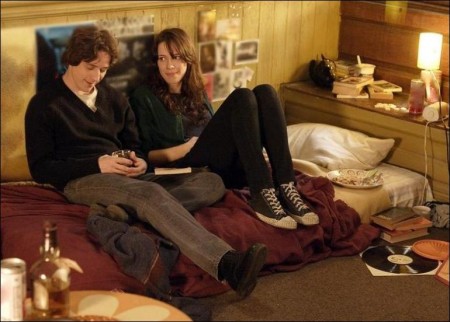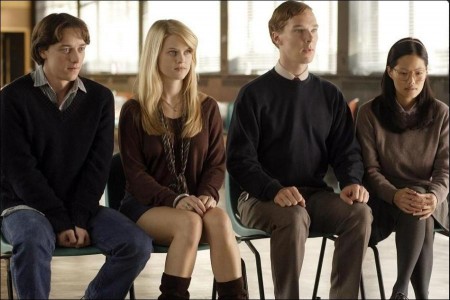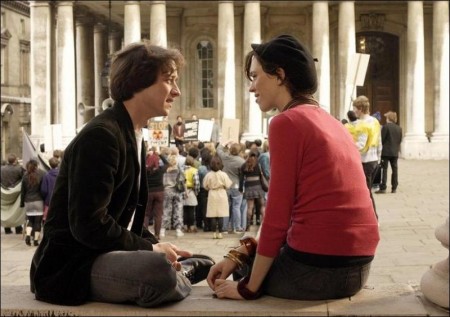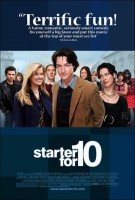Set in the mid-Eighties, “Starter for Ten” is a romantic comedy about a working-class student (James McAvoy), struggling to make his way in the rarified world of an Upper-class British University.
On his way to achieving his long-held ambition to appear on the British TV Quiz Show, University Challenge, he falls in love with his beautiful teammate (Alice Eve) and forms a plan to win her heart through his advanced general knowledge skills. “Starter for Ten” is a bitter-sweet comedy about loyalty, class, falling in love and the difference between knowledge and wisdom.
“Ever since I can remember, I’ve wanted to be clever,” Brian Jackson confesses in voice over at the start of Sarter For 10. A working-class student from Essex navigating his first year at Bristol University, Brian (James McAvoy) has a lot to prove.
While his hometown mates worry about him turning into a poncey, wanker, Brian’s biggest concern is making the team for the long-running British television quiz show University Challenge. (The game show, which began in 1962 and is something like the UK’s answer to Jeopardy, pits four-member teams from posh universities against each other. “Starter” questions, worth ten points each, give the film its title.)
Amidst Tarts & Vicars5 dances, anti-Apartheid rallies, minging6 dorm rooms and puffs of marijuana smoke, Brian also finds himself romantically torn between two very different co-eds: ultra-fit blonde bombshell and University Challenge teammate Alice (Alice Eve), and thoughtful, politically-conscious Rebecca Epstein (Rebecca Hall in Christopher Nolan’s The Prestige).
With Margaret Thatcher’s economically depressed Blighty as a backdrop, and a killer, pitchperfect New Wave soundtrack — featuring music by The Cure, Wham!, Bananarama, Yaz, The Smiths, New Order, Tears For Fears, Echo and the Bunnymen, The Buzzcocks, and The Psychedelic Furs—in the foreground, Starter For 10 is the great British teen 80s movie that never was…
It is also altogether delightful, with UK comedy sensation Catherine Tate co-starring as Brian’s steadfast mum, and McAvoy (The Lion, The Witch, and The Wardrobe’s Mr. Tumnus the Faun) delivering the kind of charming, humorous performance that reinvigorates a genre.
Though Brian Jackson knows everything, like all honest coming of-age stories, Starter For 10 is ultimately about its hero discovering the difference between knowledge and wisdom.
Directed by Tom Vaughan, based on the novel by David Nicholls, Starter For 10 is produced by Tom Hanks, Gary Goetzman and Pippa Harris and executive produced by Sam Mendes, Steven Shareshian, Nathalie Marciano and Michelle Chydzik Sowa.
1 Friends, slang
2 Affected, stuck-up, slang
3 Jerk, slang
4 Exclusive, or excessively class-conscious, slang
5 Traditional British dance in which all the boys dress as slatterns and the girls as Vicars
6 Disgusting, slang
7 Good-looking, desirable, slang
8 Affectionate nickname for Great Britain
9 Mother, slang
About the Production
“He’s a brilliant everyman, someone trying to fit in and I think that’s something we can all relate to,” says James McAvoy, the brilliant young actor who plays Brian Jackson, a working class student from an English coastal town starting his first year at prestigious Bristol University in 1985.
“The story will appeal to adults who grew up in the 80s, anyone who has gone through higher education, and anyone who’s tried to fit into something they weren’t meant for. It’s not your typical teenage gross-out comedy.”
If Starter For 10 feels perhaps more heartfelt and authentic than most films of its genre, it may be because director Tom Vaughan and author-turned-screenwriter David Nicholls attended Bristol University together during the 1980s. Years later, when Vaughan was a successful BBC television director and Nicholls’s critically acclaimed bestselling first novel “Starter For Ten” was published, Vaughan remembers “trying to pretend it wasn’t there, because I felt I wouldn’t have a chance to direct it.”
Tom Hanks’s production company, Playtone, soon optioned the book and began looking for a director. Recognizing in the book some of the qualities of his own buoyant coming-of-age directorial debut, That Thing You Do! Hanks shared the script with American Beauty and Road to Perdition director Sam Mendes who suggested they co-produce the film and stay true to the book by shooting in England with an all-British cast. A BBC producer suggested Vaughan, knowing he had worked well with Nicholls before on the BBC productions Cold Feet and I Saw You.
“What delighted me was the fact that I was making my first movie on a subject that felt so close to me, that was so personal to me,” says Vaughan. “While I’m not a writer myself I do feel very personally close to David’s writing, and as a director you need to feel an of ownership of the movie even if you haven’t written it.”
Asked about the challenges of adapting his own novel for the screen, Nicholls admits, “You take a deep breath and accept you’re going to lose some things you love. The novel is written in the first person, and I originally thought it was un-adaptable because it’s so much about Brian’s voice. I think it’s quite rare to have a very funny voice over in a film, so the biggest rule I set myself when adapting was never to include voice over if it wasn’t necessary to moving the plot forward, if it was just a joke or a passage I loved from the book.”
Starter For 10 was filmed over eight weeks on location in London, Bristol, and Jaywick, England. One of the high points of shooting involved recreating the University Challenge television set from 1985 using specifications provided by Granada Television (both the set and actor Mark Gatiss, a dead ringer for the show’s original host, Bamber Gascoigne, score big laughs with British audiences during the film’s morally complicated climax).
For scenes set in Brian’s hometown on the Essex Coast, Vaughan and company moved the production to Jaywick, an English coastal town that had never hosted a film crew before (nor had the local pub, Never Say Die, been subjected to an open-to-the-public night shoot). “I wanted to get a sense of the geographic contrast between these two places,” explains the director. “One is all about the horizon, the university is very vertical and intimidating. I didn’t want to draw attention to the camera and wanted to maintain a naturalistic shooting style—a film like Gregory’s Girl is very appealing to me in terms of its style of filmmaking innocence and charm—but I did want the viewer to understand on a deep, visual level, the contrast between where this character comes from and where he’s going.”
Brian Jackson Knows Everything
“A character like Brian Jackson can be really tricky for an actor because he has to take the audience through the story but he’s going to make annoying mistakes,” says Vaughan, who likens the role to Tom Courtenay’s title role in Billy Liar, John Schlesinger’s 1963 gem about a young Englishman’s dreams of escaping his working class family and dead-end job.
“What James brings to it is a kind of ‘X’ factor which makes you care about him even when he’s doing something cringe-worthy,” says Vaughan of McAvoy, the brilliant young actor familiar to American audiences as Leto Atreides II in the Emmy Award-winning mini-series, Children Of Dune and Tumnus the Faun from The Lion, The Witch, and the Wardrobe. “He walks the line being a young guy making mistakes and keeping you on his side. You know what he’s striving for, and I think James could identify with that.
Says Nicholls of the young actor who dominates virtually every frame of Starter For 10: “James manages to make the character likable in a way I wasn’t sure he always was on the page. He makes terrible mistakes and has terrible failings, but you see the essential goodness of his intentions even if he goes about things in a foolish way. Even before he opens his mouth he brings an amiability and likeability that’s immensely appealing. I remember seeing James for the first time on TV some time ago and thinking instantly that he’s exceptional and is going to be a big star. He’s my dream casting, really, I can’t think of anyone else for the role. He’s also just about the most committed, hardworking, serious actor that I’ve ever worked with.”
Proving disarmingly moving, too, is English television sketch comedy sensation Catherine Tate as Brian’s steadfast mum, Julie Jackson. “I worked with her very briefly on a short play just before we began casting the movie, and we’re completely delighted to have her,” says Nicholls.
“She has such likeability, warmth, and presence. Although she’s known primarily as a comedienne, when you watch her sketch show it’s just so evident that she has fantastic range and invests so fully in the characters.”
While on paper, the character of Alice Harbinson—Brian’s upper-crust University Challenge teammate—could be seen as a quintessential blonde bombshell, actress Alice Eve is able to invest her with considerable reserves of intelligence, charm, and sympathy. “The relationship with the other actors informs the playing of the character, as do days living with her in your head,” says Eve, currently seen in Tom Stoppard’s new play Rock n Roll in London’s West End. “It is an organic process that you can’t measure.”
Rounding out a cast that includes such English acting notables as Charles Dance and Lindsay Duncan, is another major acting find: Rebecca Hall, who portrays Brian’s friend and possible romantic interest Rebecca Epstein. “She’s like a young Shirley MacLaine-type character, a shrewd, smart heroine who doesn’t necessarily conform to the hero’s romantic expectations,” says Nicholls of Hall and McAvoy’s Punch-and-Judy chemistry. “She has a quality of wisdom and intelligence while always, always, always suggesting she’s the smartest person in the room. And, of course, she is an incredibly striking beauty.”
A luminous screen presence appearing in her first film, the classically trained actress—daughter of legendary theater director Sir Peter Hall, seen in Christopher Nolan’s The Prestige, with Christian Bale, Hugh Jackman, and Michael Caine—makes an interesting distinction between the worlds of theater and film: “In theater you have a context for the story that you establish and you create an entire world on stage from beginning to end, whereas in film, you’re really at those places, at that school, on that campus with extras with flock-of-seagull haircuts and shoulder pads and too much blue eye- shadow,” Hall says. “It’s an imaginative adjustment that you make, and I loved it.”
Though in Nicholls’s novel the character of Rebecca—quick-witted and cool, with an arm’s-length list of political causes—might come across as a bit astringent, Vaughan encouraged the actress to locate the character’s warmth. “On first reading Rebecca can come across as very angry, but Tom definitely encouraged me to find out why she’s like that and find the good things, the nice things, the quietness, how her sarcasm is a kind of defense mechanism” says Hall. “He asked me not to worry about playing the angry young woman and that was a really nice director’s note.”
Brian Jackson Is 80s-tastic!
“Something I felt very strongly about from the beginning,” says Vaughan, “is that I didn’t want Starter For 10 to be a cheesy 80s movie where the viewer spends the whole time laughing about haircuts and shoulder pads.”
Knowing Brian’s world extremely well having lived through it as a student himself, Vaughan’s directorial imperative demanded he be faithful to the period without turning the film into a parodied, skinny-tie nostalgia trip. “Rather than adding the 80s, what I did with the costume and production design and set departments was remove elements that were too modern. We reduced things, stripped things back, in order to locate the period,” explains Vaughan of how the crew located its universal 1985. “Our feeling was always that this is a classic story that could be told anytime.”
Says Nicholls: “We didn’t want to strive for laughs through the production design but we wanted to be accurate to the fashion of the period. Going through old photographs, we realized that the mid-eighties were a lot less flamboyant than the early eighties. Fashion-wise, the mid-eighties were actually quite gloomy; there wasn’t a kind of peacock quality people normally associate with the era. The dress was more utilitarian, darker-hued, not particularly glamorous or ostentatious. But you don’t want to watch people who look terrible for 90 minutes. Rebecca always looks kind of stylish and timeless and Brian never makes any major fashion errors.”
While McAvoy is too young to remember the 1980s much apart from its “amazing television cartoons” (counting Thundercats, The Mask, and Mysterious Cities of Gold among his favorites), he does recall “a prized possession at the time: a pair of ill-fitting stone-wash jeans with Fred Flintstone and Barney Rubble on either side.”
In some ways, Starter For 10 plays like the great, lost British teen movie of the 1980s, a UK counterpart to the American canon of John Hughes teen classics. “I grew up with those films and remember them all really well,” says Vaughan of that glorious cinematic moment when Molly Ringwald’s freckles were as mysterious and iconic as Garbo’s smile. “When thinking about Starter For 10, I certainly went back and looked at Pretty in Pink and The Breakfast Club and Ferris Bueller’s Day Off and St. Elmo’s Fire. They had a sensibility that felt right.”
Says Nicholls: “Those movies always seemed kind of alien and strange to us; there hasn’t been that same kind of teen movie tradition in the UK. I think going to school here is much more tied up in issues of class and British audiences are very wary of addressing that. Class is a sort of British obsession and I think it’s impossible to deal with education in this country without dealing with class.”
If Starter For 10 effortlessly recalls the ebullience of films like Sixteen Candles and The Breakfast Club, it’s not without an overlay of Mike Leigh or Ken Loach class conflict. Without pushing too hard, Starter For 10 offers a convincing time capsule of the failing economic policies of the Thatcher era. Not incidentally, University Challenge, the game show that plays such an important part in the film, not-too-subtly presses sensitive class issue buttons in its very format as students from new, red-brick, working class colleges and universities go up against the grand old institutions of Oxford and Cambridge.
“The politics and class issues were very much there in David’s writing and are a very important part of the story,” says Vaughan, recalling his own university days. “The politics of the time were very apparent and very much happening on campus. It’s always there, even in the background of scenes you’ll see anti-Apartheid rallies and nuclear disarmament protests. At Bristol you’d always be aware of different classes, too. I went through a state school in Scotland that in some ways mirrored Brian’s journey, and it was a real culture shock when I first got to university. The class differences were very pronounced at the time. Coming from a working class background, Brian not only has to deal with the issue of leaving behind his friends but the fact that once he gets there his upbringing and education to that point have not prepared him for that world whereas the more posh kids have the confidence and are prepared for that.”
McAvoy, too, related to this aspect of Brian’s journey. “I identified with him as I went through a similar process going from my home life to drama school where the people were just so different and I ended up making several terrible Brian-like faux-pas,” McAvoy explains. “I responded to Brian’s response: the effort that goes into trying to fit into his new surroundings. It’s interesting because class transition can be a healthy thing, but not if it is your outright objective.”
Says Nicholls: “Starter For 10 fulfills all those elements of a teen romantic comedy but we haven’t had to eradicate elements of class and politics and sexual politics of the time. It’s a rich mix.” And, as period-specific as it is, Starter For 10 manages to transcend the 80s. “The film deals in many ways with the things that never change,” says Eve. “Love, the University experience, music, mistakes, and relationships of all colors.”
Brian Jackson’s “In Between Days”
“Musically, my memories of that time are all about The Cure,” says Nicholls, whose original novel contains a good number of musical cues and quoted lyrics. “What I didn’t realize is that when you quote a song in a book you have to pay for it, and it can cost quite a bit of money!”
For his part, director Vaughan had a dream 80s soundtrack—The Cure, New Order, Yaz, Wham!, Bananarama, The Psychedelic Furs, Tears For Fears, Echo and the Bunnymen, The Smiths, Blue Monday—playing in his head during the editing process. “I tried a lot of different tracks in the editing room. I thought, let me just put on all my favorite 80s tracks. It was real trial-anderror, and I never expected to get them all.”
The film’s unlikely musical patron saint proved to be The Cure’s front-man Robert Smith. A fan of the book, there was a moment when it appeared Smith would contribute original material for the soundtrack (something he had never done before). When the timing didn’t coalesce, Smith was still able to give the project his blessing, which opened a multitude of doors for musical clearance rights. (Smith’s contribution is thanked in the film’s end credits.)
No fewer than five Cure classics—”Love Song,” “Pictures of You,” “Six Different Ways,” “In Between Days,” and “Boys Don’t Cry”—can be heard on the soundtrack, soon to be available on Playtone Records/Rhino Entertainment. The result is perhaps the most evocative soundtrack since Rushmore, a play-list perfectly attuned to the pulse of its lead character’s angst and innate heroism.
Production notes provided by Picturehouse.
Starter for 10
Starring: James McAvoy, Ian Bonar, Dominic Cooper, James Corden, Benedict Cumberbatch, Charles Dance, Alice Eve, Raj Ghatak, Rebecca Hall
Directed by: Tom Vaughan
Screenplay by: David Nicholls
Release Date: February 16, 2007
MPAA Rating: PG-13 for sexual content, language and a scene of drug use.
Studio: Picturehouse
Box Office Totals
Domestic: $216,839 (12.5%)
Foreign: $1,519,555 (87.5%)
Total: $1,736,394 (Worldwide



